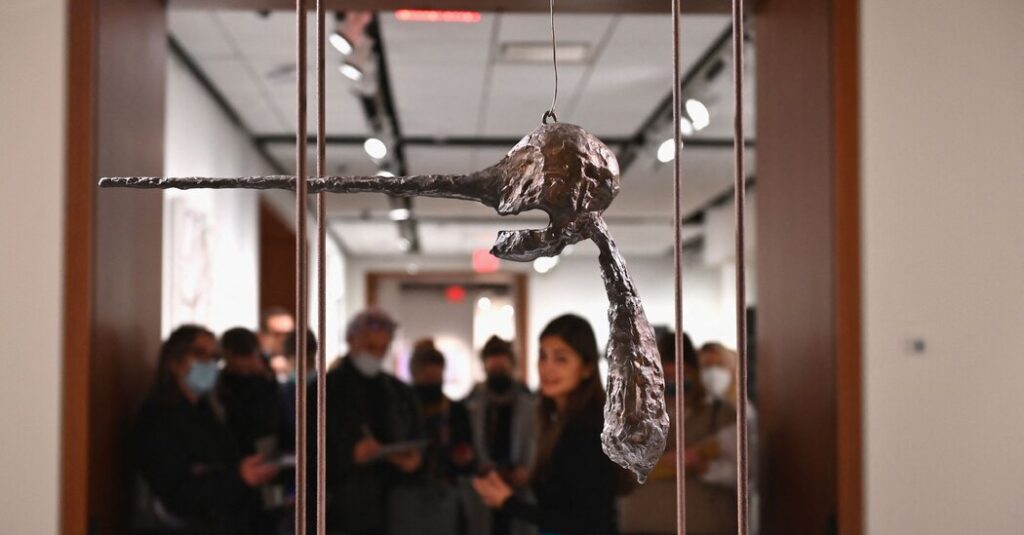Billionaire art collectors rarely air their deals or dirty laundry out in public. But a battle between a pair of boldfaced names over a Giacometti sculpture is now playing out in the open, shining a rare light on a global market featuring unlicensed agents, multi-million-dollar handshake deals and pervasive secrecy.
The Chinese crypto entrepreneur Justin Sun and the American entertainment executive David Geffen are slinging written accusations at each other in federal court in New York, each claiming to be the rightful owner of Alberto Giacometti’s “Le Nez” (“The Nose”). Along a trail stretching from New York to Singapore to Paris and back to the United States, Mr. Sun says the sculpture was secretly sold by a dishonest adviser and sued for its return from Mr. Geffen, who recently struck back, accusing Mr. Sun of devising an elaborate fraud because he regrets the sale.
Adding to the tangle is an agent who might or might not be to blame, and might or might not be in a Chinese detention center.
At a 2021 auction in New York, Mr. Sun, who founded the crypto platform Tron in Singapore, paid $78.4 million for “Le Nez,” a midcentury work of bronze, steel and iron depicting a head, suspended in an open cage and boasting a very long nose.
Mr. Geffen, in turn, bought the sculpture last year while it was on loan to the Giacometti Institute in Paris.
But early this year, Mr. Sun sued, alleging that an adviser who sold it to Mr. Geffen, for $10.5 million and two unnamed paintings, had done so without his permission, forging documents and inventing a nonexistent Chinese lawyer to make the deal. The accused adviser was publicly connected with Mr. Sun and his art purchases for years and spoke about advising him on his bid for the Giacometti and other pieces.
Last month, Mr. Geffen sued Mr. Sun, accusing him of concocting a “sham” story about his adviser making an illegitimate sale. In reality, he charged, Mr. Sun had “seller’s remorse” after trying to sell the paintings included in the deal, but finding they did not fetch offers as high as he had hoped.
Mr. Sun’s lawyers fired the latest salvo on Wednesday, telling the court that Mr. Geffen is “completely misguided” and should actually be suing the adviser, who they say has been detained in China since February “in connection with her confessed fraud and theft” — a claim that could not be independently verified.
A lawyer for Mr. Sun, William Charron, said in an email that Mr. Geffen’s claims are “desperate and bizarre” and that he is clinging to a “fiction” that the adviser is not a thief.
Whether there was really a theft is crucial, but will not necessarily decide the case, art lawyers say. If the adviser transferred the sculpture without authority, Mr. Sun could be named the rightful owner. Or Mr. Geffen could keep the sculpture if his reliance on her representations was reasonable.
“I’ve been in the art world for decades and I’ve seen so many shady deals. It’s a business like nothing else,” said Joshua Kaufman, an art lawyer in Washington, D.C. “Either side’s version could be true.”
There are many facts in dispute and Mr. Sun’s case faces an “uphill battle,” said Jana Farmer, an art lawyer in New York.
The claims and counterclaims fill hundreds of pages, and the gaps between the billionaires’ accounts are vast. Mr. Sun says his adviser was a freelancer perpetrating an “elaborate ruse.” Mr. Geffen contends that Mr. Sun has been trying to delete text messages and evidence on the internet.
Practically the only thing they appear to agree on is that the paintings traded in the 2024 deal are not to be publicly identified. The secrecy is most likely to avoid tainting the paintings’ value with the fight over the sculpture, experts say.
Mr. Sun, 34, is no stranger to controversy, in the art world and beyond. He made waves last year with his $6.2 million purchase of a conceptual piece consisting of a banana taped to a wall, and prides himself on challenging traditional notions of value.
In 2023, the S.E.C. accused him and Tron of fraudulently inflating the price of their crypto tokens. Mr. Sun drew criticism for spending $75 million late last year on crypto tokens linked to Donald Trump in what was seen as an effort to influence the incoming president to abandon the case, which he denied. The case was stayed by a judge this year at the government’s request.
Mr. Geffen, 82, is a major collector who began buying art before Mr. Sun was born. The case against him by Mr. Sun challenges both Mr. Geffen’s ownership of “Le Nez” and his “great standing” as a savvy collector, Ms. Farmer said, “and tries to put his reputation on the line.”
She said she thinks the billionaire collectors will ultimately settle their unusually public dispute. If so, it could be only a brief glimpse into a mystery-shrouded business before the shades are drawn again.

